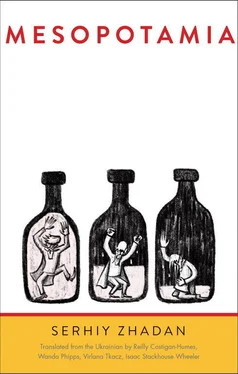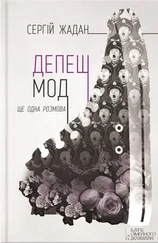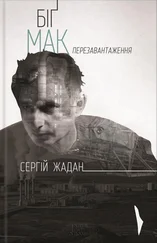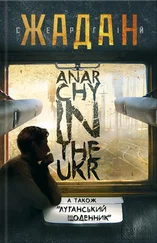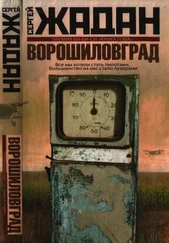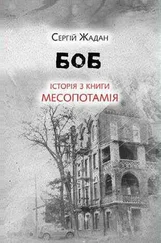There were a lot of them. I couldn’t even see the ones standing in the back, but I could feel their warmth, which iced up my nostrils and throat. There were about fifty of them, maybe even a few more—my eyes still hadn’t adjusted to the bright morning light—their features were frozen black, as though they’d been etched out of old metal. They wore street clothes, all of them in their twenties or thereabouts—short hair, comfortable athletic footwear, light, hooded jackets, and dark, baggy tracksuit bottoms, standing motionless and clearly waiting for me to appear. “They’ve got me,” I thought, leaning up against the brick wall.
They were all scrutinizing me, looking discerningly into my eyes and catching my panicky movements. Finally, one of them—clearly the top dog—spoke.
“You from here?” he asked, nodding at the apartment windows up above.
“Yep.”
“Been livin’ here awhile?”
“Not too long,” I answered honestly.
“Do ya know Black Devil?”
I hesitated. “Who are they?” I thought. “What should I tell ’em?” I knew Black Devil, and he knew me, too. But I didn’t know if that was good or bad. I decided to just be straight with them.
“Uh-huh.”
“Do you know where he is?” the top dog asked, stepping extremely close to me and lowering his voice.
“Nope. How would I?”
“You sure ’bout that?” The top dog was right in my face now. He smelled like gasoline.
“I’m sure.” I tried not to break eye contact.
“All right then,” the top dog said quietly. “Let us know if you hear from him.”
“Who are you guys?” I couldn’t help but ask.
The top dog lurched back and took a look at me, genuinely surprised. Then he leaned in once again and started speaking quietly, almost whispering. I caught some words, while others flew past me hopelessly. I lacked the resolve to ask for any clarification; I listened, bewildered, and committed the bits and pieces I could hear to memory, because he spoke of important things. Things so important that I didn’t need to hear them—I already knew.
“We’re tax collectors,” the top dog said. “Tax collectors and sentinels. We collect tribute from those who owe it; we collect it to maintain a state of perfect balance. There’s enough to go around when we take away the superfluous and return that which is lacking. We hunt debtors and support the fearful. We receive duties from the thrifty and generous, from the gullible and conniving; we collect them in the upper neighborhoods and in the poor neighborhoods across the river. We secure hefty monthly payments from bankers and entrepreneurs, but we don’t turn our noses up at the few coppers the factory workers, cobblers, and secondhand dealers can scrape together. We collect—coin by coin, bill by bill—documenting every wire transfer and preserving every pay stub, since we know that everything must be paid for. You can’t leave anyone your debts, you can’t leave this world a debtor, you have to return everything that doesn’t belong to you, and you have to settle accounts for everything you have received throughout your life. But we don’t just collect money and other valuables. We collect unpaid anger every month, we collect rage and enmity, we collect valor and brewing vengeance. Most important, we collect all this city’s unpaid love, every morsel of it, every last gasp of love. All of us in this city are essentially love collectors. We collect it every morning, we seek it out every evening, then we find it every night, because there simply can’t be unpaid love, love bottled up inside, because all that love belongs to the city, because the city is held up by that love, filled with it, like its streets soaked with rain in the spring, warmed by it, like its homes heated by coal in the winter. The city would die of cold and thirst without it, without all that love; the city’s last holdouts would desert it, leaving it like a labyrinth, no longer able to wander aimlessly up and down its streets and back alleys. So no matter what transpires, no matter what happens to all of us, no matter how tough fate is on us, and no matter what misfortunes fall upon our rooftops, we are determined to continue collecting these large, unseen duties, atom by atom, breath by breath, death by death. By finding common ground with those who don’t conceal anything. By persuading those who don’t trust us. By destroying those who get in our way. Just tell Black Devil that.” The top dog slowly arched his head back, stepped to the side, turned toward his crew, said something to them, turned around, and made for the river. The rest of them followed him. Only puddles of gasoline remained, reflecting the faded sky of August.
She moved in a week later. She didn’t bring any stuff with her, saying that she wasn’t sure whether things would work out between the two of us. Things did work out, but she started an earth-shattering fight a few months later. It went how it always does—the first spark came out of nowhere, but the flame of animosity devoured everything, consuming all our memories like a massive fire at the docks, destroying every single ship. She yelled for hours, deeply hurt by something. I was deeply hurt too, but mostly by my own reaction. Heading out the door, she said she’d be changing her number so I couldn’t call her. I asked her not to do that, promising her I wouldn’t call. But I called in the early evening, just to check. She really had changed her number. “Well, this is a good thing,” I thought, still angry at myself. “It’s a good thing I’m dead to her. It’s a good thing everything happened so quickly and we didn’t drag out our failing relationship. It’s a really good thing, really, really good. What’s so good about it, though?”
She came back a month later and then left again in the winter, asking me for some time to think things over. She got married while she was thinking, but didn’t sever ties with me, obviously. I started feeling jealous of her husband.
“What do you need him for?” I asked. “What are you keeping him around for? You’re just putting him through a lot of pain.” She agreed with me, but couldn’t divorce him, obviously. Well, and he wouldn’t just leave without a fight. I wanted to have a talk with him. She forbade me to do so, throwing hysterical fits and saying she’d kill herself if he found out about me. She promised to sort everything out, obviously, promised me that everything would be all right. In the spring, they got divorced.
“What was the point of getting married in the first place?” I asked. She explained, saying something about debts that we have to repay to those who love us, about the love that drives all of us, about payments and settlements, about honesty and justice. I realized that they were still seeing each other, although she’d never said anything about it, obviously. That’s how the summer started. In June, she said she was pregnant. It wasn’t mine, obviously. It wasn’t his either, obviously.
“I’d say that America really is a country where everyone enjoys equal opportunity,” Bob Koshkin wrote in one of his concise emails to his friends and family. “In my view, America’s unshakable constitutional framework and sound democratic principles are foundational to that equality. I believe in the viability and flexibility of American liberalism, under the auspices of which big business and government regulatory agencies work together harmoniously for a better future. The only thing that’s a bit unsettling… that’s not the right way to put it—the thing that absolutely floors me—is that there are just so many black people everywhere.”
He had landed at John F. Kennedy International Airport two months ago, at the beginning of the summer, boldly disembarked, and forged on, thinking, “This is how Columbus must have felt way back when.” He wobbled through the terminal like a sailor walking on solid ground; just thinking about the vast ocean he’d crossed made his muscles spasm, but he’d reached American soil and it was high time to explore the continent and civilize the natives. Once Bob got into the city, he called his old high school classmate who had been hanging his hat in the East Village for the past decade or so. His classmate showed up in half an hour wearing a bathrobe, no less. Bob was decked out in a cowboy hat with Carpathian red deer running around the band, a light jacket, and flashy, colorful shorts. There’s a chance his classmate wouldn’t have recognized him without those shorts. They hugged, and even kissed each other, looking like two transvestites meeting again after a prolonged separation. The transvestite in shorts was happy to see his old partner, while the transvestite in the bathrobe would have preferred to put the reunion off as long as possible. Bob’s classmate didn’t invite him back to his place. They went to the Chinese restaurant around the corner and ordered some tea. Bob was counting on his classmate picking up the tab, so he sat on his hands until he did. Bob opened up his dad’s leather suitcase, with the heads of lovely East German girls pasted all over it, and took out a souvenir plate that had Crimean landscapes on it, of all things.
Читать дальше
